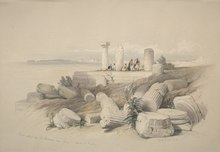ام العمد | |
 Ruins in 1839, published in The Holy Land, Syria, Idumea, Arabia, Egypt, and Nubia | |
| Location | Near Naqoura, Tyre District, South Lebanon |
|---|---|
| Coordinates | 33°07′41″N 35°09′13″E / 33.128°N 35.1535°E |
| History | |
| Founded | 287–222 BCE |
Umm Al Amad (Arabic: ام العمد), or Umm el 'Amed or al Auamid or el-Awamid, is an Hellenistic period archaeological site near the town of Naqoura in Lebanon. It was discovered by Europeans in the 1770s,[1] and was excavated in 1861.[2] It is one of the most excavated archaeological sites in the Phoenician heartland.[3]
- ^ Mellink, Machteld J. (September 1965). "Oumm el-'Amed, une ville de l'époque hellénistique aux échelles de Tyr by Maurice Dunand, Raymond Duru". Journal of Biblical Literature (review). 84 (3): 326–328. doi:10.2307/3265046. JSTOR 3265046.
- ^ The Phoenician's Route, LAU-Louis Cardahi Foundation
- ^ Vella, 2000, pp. 34–35: "The monumental report dedicated to Oumm el-‘Amed is by far one of the most detailed accounts of an excavation in the Phoenician heartland. The site is well known in the general literature, with entries in all the recently published research aids on Phoenician history, and the reconstructions of the temples have served as benchmarks for the study of other sites."
